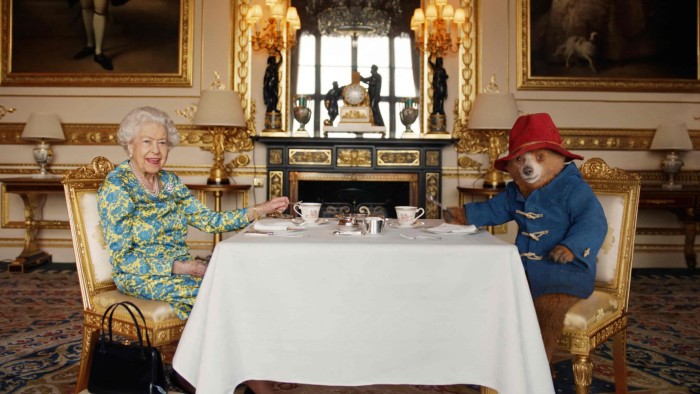Unlock the Editor’s Digest for free
Roula Khalaf, Editor of the FT, selects her favourite stories in this weekly newsletter.
The writer is an author of fiction, cookery books and poetry anthologies. Her latest book is ‘The Dinner Table’, a collection of food writing
Strange things happen when queens die. A solar eclipse, perhaps; or a comet bringing portents of changing times. When, two and a half years ago, Elizabeth II shuffled off this mortal coil, more than a thousand small bears — each in smart blue duffel coat and battered red hat — were left at the gates of Buckingham Palace. Odd portents indeed. What will history make of that?
The future historians will find plenty of clues. Long after the source text crumbles and the internet decays into dead wires, the great weight of court records will bear witness: let it be known that Paddington Bear — for it is he! — is a national symbol of “kindness, tolerance and promotes integration and acceptance in our society”. To desecrate his statue — as two drunk RAF engineers found to their detriment on Tuesday — is not only a crime worth a hefty fine and 150 hours of unpaid toil, but “the antithesis of everything Paddington stands for”.
Reading magistrates’ court rose to unlikely global prominence when District Judge Sam Goozee summed up a nation’s obsession with our friend PB. He ruled that in “an act of wanton vandalism”, the men had ripped the newly installed statue from a bench in Newbury, birthplace of Paddington’s creator Michael Bond. It is exactly as hard as you would think to drunkenly rip a life-size statue of a little brown bear in half. A sustained attack, then, on something small and nice.
It is probably unnecessary to explain Paddington, but — should Goozee’s remarks not suffice — it’s worth saying that he is from deepest Peru. He arrives namelessly at Paddington Station with a battered suitcase, a jar of marmalade, and a label around his neck: Please look after this bear. Thank you. The bear is looking for a home, and a name, and he finds both with the Brown family.
Paddington, of course, is the Britain we would like to be, or rather, the Britain we would like to think we are. Much like the Kindertransport statues at Liverpool Street, we want to think of ourselves as generous, welcoming, all-embracing. And to an extent, of course, it’s true. To a much greater extent — what statues to the Jewish people to whom we refused entry, for example? — it’s not.
We are told that today more people than ever are battening down the hatches and turning away from others. We are told that we live in selfish times. Maybe so — but that can’t be the whole story. If it was, why would Paddington persist? Why would we still, almost 70 years after his creation, care enough to put up statues in his honour, and bring little replicas on the death of our head of state? Why would his adventures bring in the better part of a billion dollars at the box office? Three films, 29 books, a three-season TV series, a commemorative 50p piece and the nation’s outrage at the airmen’s attack make it clear that our obsession with Paddington is as profound as it is lengthy.
It’s not just that Bond was a brilliant writer — or that Paddington is very sweet. Bond’s guinea pig creation, Olga da Polga, is incredibly sweet but has never even touched the hem of her more famous cousin’s duffel coat. Some things just strike right at the heart, and enter the great book of national legend.
Of course they are myths, but myths are what make us human. The stories we tell ourselves matter; and who we want to be matters almost as much as who we are — provided we’re prepared to take steps to get there. Maybe not everyone can be the Brown family. Not everyone can take in the lost, or shelter the vulnerable. (Not everyone has a very beautiful house, with housekeeper, in Primrose Hill.)
But perhaps, in these ever-changing times, it’s not always about being the Brown family — but about being Paddington himself: open-hearted, polite, with a snack packed in case of emergency. Ready for anything, no matter what strange portents may come.




